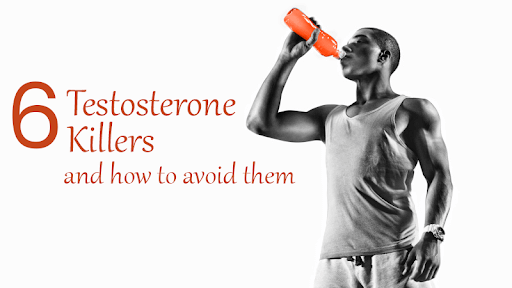Healthy testosterone levels are critical to both men and women because of the many benefits testosterone creates within our bodies. These benefits include the development of strong muscles and bones, a positive mood, a powerful sex drive, a stable memory, a reduced level of body fat, and a productive heart.
Given the importance of testosterone, we should do whatever is required to ensure that we have enough (but not too much) of it in our systems; yet there are so many people in the world with clear deficiencies. To make matters worse, this damage is often self-inflicted, and most of the causes of low testosterone are easily corrected by making a few small modifications to our lifestyle.
To develop a healthy level of testosterone, here is a list of six testosterone killers that you should avoid.

#1 -- High Body Fat and Low Dietary Essential Fat
Years ago, a study was conducted on the causes of low testosterone. After evaluating 100 participants - 50 who carried excess body fat, and 50 who had a low percentage of body fat - it was discovered those who had excessive amounts of body fat also suffered from low testosterone.
As a result of this study, low testosterone was considered to be directly related to having a high level of body fat. So, in an attempt to get rid of the excess body fat it was suggested that people should eliminate fat from their diets.
Several years later, additional studies proved that if you didn’t have enough fat in your diet, this could cause low testosterone. This seemed like an inconsistency. On the one hand, if you eliminated fat from your diet this could cause low testosterone. On the other hand, if you had an abundance of body fat this could also cause low testosterone.
The first thing you need to realize is you can’t categorize all fats the same way. The fat on your body will suppress your testosterone level, but the essential fatty acids that you ingest help to decrease your body fat and increase testosterone.
To keep your testosterone at an optimal level, eat an appropriate amount of healthy fats and maintain a low level of body fat.

#2 -- Low Protein
Testosterone is a hormone, and all hormones and enzymes are created from protein. Therefore, it should stand to reason that ingesting the proper amount of protein is going to be a significant piece of any testosterone-building strategy. Moreover, it’s nearly impossible to generate an ideal level of testosterone in your system if you restrict protein in your diet to a harmfully low level.
Proteins are essential to your body for a multitude of reasons. If you work out, your body requires more protein to grow muscle fibers. Without protein, you’re engaging in a substandard workout with minimal benefits, and you’re also contributing to a net reduction in the amount of testosterone present within your body.
If you believe you’re suffering from a low level of testosterone, you should increase the quantity of protein in your daily diet. Just make sure they are high-quality protein sources because the quality of the protein is very important to the muscle-building process.

#3 -- Anabolic Steroids
Everyone who knows anything about me knows how I feel about anabolic steroids. In short, I think they’re detrimental to anyone who takes them. With that out of the way, I’m going to focus on the science involved with long-term testosterone production.
Anabolic steroids are a synthetic hormone, and if you take them, your natural testosterone will eventually stop being produced. When the synthetic testosterone enters your body, it suppresses your body’s ability to create its own testosterone. As a result, when you get off steroids or any of the other hormones you might be taking, your hope is that your body will initiate its own hormone-production process once again. Honestly, this is a greater risk than many people realize, because sometimes the body never redevelops its testosterone-making capabilities. There is a possibility the secretion level of your normal natural testosterone may never return to normal.
If your body stops producing testosterone, you may experience side effects like sterility, the growth of female breast tissue, and a host of other unintended consequences that you probably never considered when you originally started taking steroids.
In the long run, steroids are one of the most prominent testosterone killers. For life, health, and longevity it is best to avoid them.

#4 -- Type 2 Diabetes
More than 34 million Americans have diabetes. What’s worse, nine out of every ten people with diabetes have type 2 diabetes.
Testosterone has a cyclical relationship with type 2 diabetes. A lack of testosterone in men results in an increase in body fat, which in itself is a factor that contributes to a reduction in testosterone levels, and a worsening of the symptoms of type 2 diabetes. To make matters even worse, some of the symptoms of type 2 diabetes - severe hunger, thirst and fatigue - can exacerbate the problems, because the combination of eating and drinking a lot of food and then not doing anything to burn calories is a perfect formula for maintaining body fat, and thereby maintaining the illness along with it.
If you have type 2 diabetes, this is an illness that is most often dictated by lifestyle choices, personal activities, and specifically by what you put in your mouth. While there is no known cure for type 2 diabetes, it is a condition you can significantly mitigate the effects of by taking control of your life and your habits. Foremost among those habits is going to be the consumption of sugar, which is yet another testosterone killer. Severely limiting the sugar in your diet, exercising, and eliminating excess body weight are your best bets for controlling type 2 diabetes, and hopefully causing it to go into remission.
If you have type 2 diabetes and you’re experiencing low testosterone, a lack of energy, depression, a low sex drive, or any other symptoms, your best way to alleviate these problems is by altering your lifestyle through dietary choices and activity level.

#5 -- Low Zinc and Vitamin D
For many people, a low level of testosterone is caused by a simple lack of zinc and vitamin D. Zinc and vitamin D both help to increase your body’s ability to produce the testosterone hormone, but they work in very different ways.
Vitamin D helps to develop skeletal muscle, and muscle growth and muscle use contributes to an elevated production of testosterone. Moreover, studies have shown that individuals taking a vitamin D supplement maintained more testosterone in their systems than those who did not supplement their diets with vitamin D.
Oily fish and egg yolks have long been touted as two of the best sources for vitamin D, but the vitamin is also produced naturally by exposure to sunlight.
Therefore, if your testosterone levels have been suffering, getting outside and exposing yourself to sunlight is the simplest way to receive a natural testosterone boost. This works even more effectively if you choose to exercise while you’re spending time outdoors.
Zinc assists the body in building the enzymes that contribute to protein management. And, as we’ve already covered, protein is critical to the production of testosterone.
Most people could easily get an adequate amount of zinc in their diets from natural sources simply by consuming a regular amount of beef. If you’re not a beef eater, or if you’re looking to get your zinc from plant-based sources, cereal grains and baked beans are also solid sources of zinc.

#6 -- Excessive Cardiovascular Training
Endurance athletes and others who routinely train for long periods of time develop higher levels of cortisol in their bodies. It can be considered as one of the testosterone killers for your body. Cortisol and testosterone have an inverse relationship with one another. When cortisol levels go up, testosterone levels go down, and vice versa.
There is nothing fundamentally wrong with cortisol inasmuch as it is a natural defense mechanism that your body utilizes against certain sets of stimuli and environmental conditions. Cortisol responds to specific kinds of stress by helping to regulate the body’s metabolism, minimize inflammation, and optimize blood sugar levels.
However, as your body’s primary stress-defense mechanism, cortisol typically remains at elevated levels in response to extended bouts of cardiovascular exercise, which your body is interpreting as a short-term, fight-or-flight scenario. In essence, when your body is preoccupied with short-term survival, it starts trying to save itself by directing its resources to prolong your life rather than trying to build muscles for long-term use.
One way to avoid giving your body an excuse to flood itself with cortisol in an effort to escape from a stressful situation is to keep all of your cardiovascular training sessions to 45 minutes or less. This way, you should be able to maximize the calorie-burning portion of your workout without forcing your body to send chemical signals that will inhibit your overall ability to develop the muscle you want.
I hope this list of testosterone killers has been beneficial to you. For more great fitness tips, feel free to check out the blog at RonWilliamsChampion.com, and also the Ron Williams channel on YouTube!


